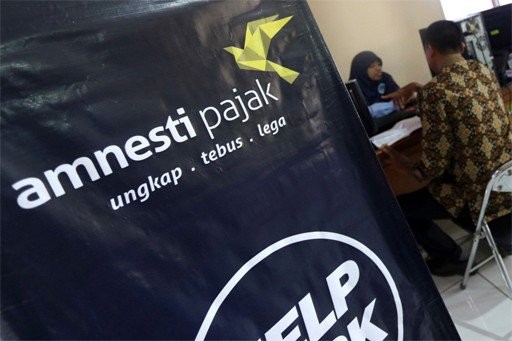Popular Reads
Top Results
Can't find what you're looking for?
View all search resultsPopular Reads
Top Results
Can't find what you're looking for?
View all search resultsTycoons rush in as 1st stage ends
Change text size
Gift Premium Articles
to Anyone
A
s the clock ticks toward the end of the tax amnesty’s first phase, conglomerate owners have started to swarm into tax offices to report their undeclared assets.
Chandra Lie, co-founder and president director of private carrier Sriwijaya Air, became the latest tycoon to take part in the government’s tax amnesty program. The businessman submitted his amnesty application at the Large Taxpayer Office (LTO) in South Jakarta on Monday.
Chandra, like other businessmen who took advantage of the amnesty earlier, kept mum about the details of his assets, merely stating that most of them were located onshore and only a small amount was kept overseas to fund his children’s school fees, among other things.
“I will repatriate some of the funds to buy more planes,” he told journalists after submitting his documents.
Prior to Monday, several other tycoons publicly declared their participation in the program, such as Santini Group founder Sofjan Wanandi, Lippo Group boss James Riady and Central Cipta Murdaya founder Murdaya Poo.
Tommy Soeharto, son of former president Soeharto, is included on the list as well.
As of Monday, there were 514 individual taxpayers and 57 legal entities that had submitted asset statement letters (SPH) in the first phase to the LTO, which handles about 1,200 large taxpayers. Their participation resulted in Rp 7.5 trillion (US$577.5 million) in penalties or redemption payments — including from the tycoons — and Rp 279.2 trillion in declared assets.
The first phase, during which the lowest penalty rates of 2 percent and 4 percent are imposed compared to in the second and third phase, will end on Sept. 30.
With several days left, the amount of money redeemed from large taxpayers accounted for less than a fifth of the nationwide figure of Rp 45.9 trillion. The nationwide figure itself was equal to 27.8 percent of the Rp 165 trillion targeted by the government.
The amount of repatriated assets reached Rp 98.7 trillion, 9.9 percent of the target, and the amount of declared assets was Rp 1.94 quadrillion, almost half of the target.
JPMorgan wrote in a recent report that the declared asset figure had been higher than the $30 billion to $50 billion the market initially expected.
“We now think that the final tally by March next year could be Rp 2 quadrillion. We estimate this may create fiscal headroom of 0.3 to 0.5 percent of GDP [gross domestic product] without second-order benefits,” the report said.
According to JPMorgan, the immediate boost to government revenues via penalties could be from Rp 50 trillion to Rp 60 trillion, in line with Bank Indonesia’s (BI) earlier estimates.
“The bigger impact, in our view, could be from taxation of future earnings from declared assets and then the second order from investment or consumption benefits. Assuming a 10 percent return on assets, we arrive at a potential Rp 40 trillion to Rp 60 trillion annual impact, or about 0.3 to 0.5 percent of GDP as additional first-order fiscal headroom.”
Publicly listed lender OCBC NISP, the local subsidiary of Singapore-based OCBC, claimed that there had been inflows of money from overseas since its appointment as a gateway bank two weeks ago.
OCBC NISP president director Parwati Surjaudaja said some customers had chosen to repatriate their funds, but the total amount was still less than Rp 100 billion. The lender had also facilitated penalty payments exceeding Rp 1 trillion.
Meanwhile, the government expected to attract higher participation by issuing two more finance minister regulations (PMKs) that ease several rules, including the reporting requirement that has been revised to once a year from once every six months during the mandatory three-year investment period.
The government also held a coordinating meeting with BI and the Financial Services Authority (OJK) for the same purpose. “The State-Owned Enterprises Ministry is preparing steps for state-owned companies to absorb repatriated funds as well,” Coordinating Economic Minister Darmin Nasution said after the closed-door meeting.
The OJK has even established a special team to expedite the necessary process for companies wishing to conduct corporate actions, such as initial public offerings (IPO) and bond issuances.
The OJK commissioner for capital market supervision, Nurhaida, said the financial regulator had issued follow-up regulations regarding capital market products that were allowed to absorb repatriated funds, such as stocks, bonds and real estate investment trusts (REIT). (mos)
_________________________________
To receive comprehensive and earlier access to The Jakarta Post print edition, please subscribe to our epaper through iOS' iTunes, Android's Google Play, Blackberry World or Microsoft's Windows Store. Subscription includes free daily editions of The Nation, The Star Malaysia, the Philippine Daily Inquirer and Asia News.
For print subscription, please contact our call center at (+6221) 5360014 or subscription@thejakartapost.com










